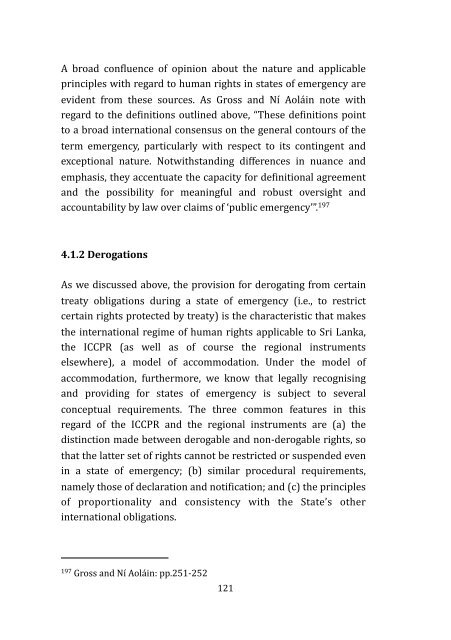States of Emergency - Centre for Policy Alternatives
States of Emergency - Centre for Policy Alternatives
States of Emergency - Centre for Policy Alternatives
Create successful ePaper yourself
Turn your PDF publications into a flip-book with our unique Google optimized e-Paper software.
A broad conLluence <strong>of</strong> opinion about the nature and applicable<br />
principles with regard to human rights in states <strong>of</strong> emergency are<br />
evident from these sources. As Gross and Ní Aoláin note with<br />
regard to the deLinitions outlined above, “These deLinitions point<br />
to a broad international consensus on the general contours <strong>of</strong> the<br />
term emergency, particularly with respect to its contingent and<br />
exceptional nature. Notwithstanding differences in nuance and<br />
emphasis, they accentuate the capacity <strong>for</strong> deLinitional agreement<br />
and the possibility <strong>for</strong> meaningful and robust oversight and<br />
accountability by law over claims <strong>of</strong> ‘public emergency’”. 197<br />
4.1.2 Derogations<br />
As we discussed above, the provision <strong>for</strong> derogating from certain<br />
treaty obligations during a state <strong>of</strong> emergency (i.e., to restrict<br />
certain rights protected by treaty) is the characteristic that makes<br />
the international regime <strong>of</strong> human rights applicable to Sri Lanka,<br />
the ICCPR (as well as <strong>of</strong> course the regional instruments<br />
elsewhere), a model <strong>of</strong> accommodation. Under the model <strong>of</strong><br />
accommodation, furthermore, we know that legally recognising<br />
and providing <strong>for</strong> states <strong>of</strong> emergency is subject to several<br />
conceptual requirements. The three common features in this<br />
regard <strong>of</strong> the ICCPR and the regional instruments are (a) the<br />
distinction made between derogable and non‐derogable rights, so<br />
that the latter set <strong>of</strong> rights cannot be restricted or suspended even<br />
in a state <strong>of</strong> emergency; (b) similar procedural requirements,<br />
namely those <strong>of</strong> declaration and notiLication; and (c) the principles<br />
<strong>of</strong> proportionality and consistency with the State’s other<br />
international obligations.<br />
197<br />
Gross and Ní Aoláin: pp.251‐252<br />
121











